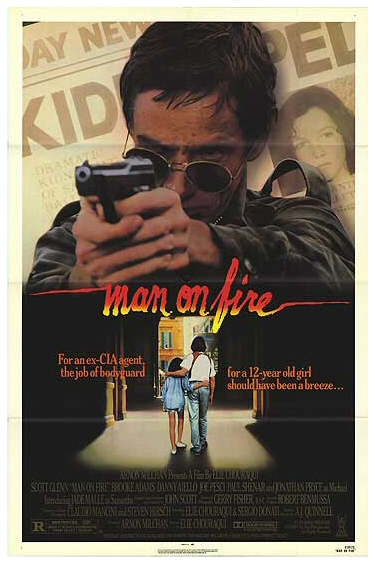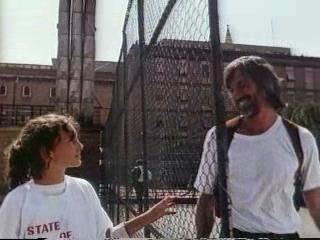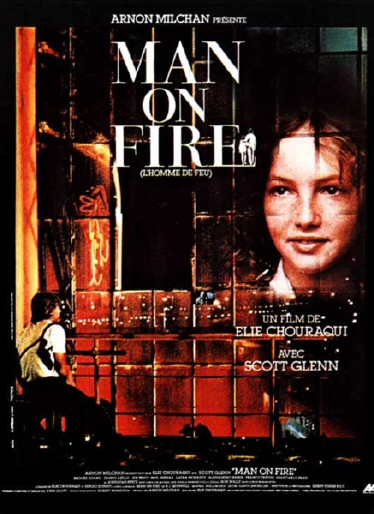
LAMBERTATHON:
LOVE SONGS (1984)... and MAN ON FIRE (1987)
page 2
john cribbs
But let's de-Lambert-ify this Lamberathon for a moment. This was the fourth romantic drama in a row for director Elie Chouraqui (the previous three had all been vehicles for Anouck Aimée.) Strangely enough, his follow-up - and first English language film - turns out to be the 1987 action/revenge movie Man on Fire* with Scott Glenn and Joe Pesci, later remade by Tony Scott with Denzel Washington. Both films are based on the first of five AJ Quinnell** novels featuring Marcus Creasy, a grizzled, middle-aged, alcoholic ex-soldier of fortune who reluctantly accepts the assignment to serve as bodyguard to an affluent couple's young daughter in kidnap-happy Milan. His attitude towards the kid, initially cold and distant, eventually develops into one of close friend/surrogate father. Of course she ends up getting kidnapped and Creasy reverts to his former dark self, seeking vengeance on her abductors. The novel has one of the coolest epigraphs of all time:
 Give me, God, what you still have,
Give me, God, what you still have,
Give me what no one asks for;
I do not ask for wealth
Nor for success, nor even health-
People ask you so often, God, for all that
That you cannot have any left.
Give me, God, what you still have;
Give me what people refuse to accept from you.
I want insecurity and disquietude,
I want turmoil and brawl,
And if you should give them to me, my God,
Once and for all
Let me be sure to have them always,
For I will not always have the courage
To ask you for them.
- ZIRNHELD, The Paratroopers' Prayer***
That pretty much sums up the character of Creasy, a former paratrooper himself whose experience in war-torn environments like Algeria and the Belgian Congo has left him mentally torn apart and unable to stay out of trouble. Interestingly, the character - an American - is changed from a former member of the French Foreign Legion to ex-CIA in both movie versions, even the first one directed by a French filmmaker. Chouraqui makes him a Vietnam vet for good measure, including a single flashback shot of Glenn flipping out in the bush, but he keeps the setting in Italy (the 2004 movie takes place in Mexico City.) Scott Glenn is an interesting choice to play Creasy (who for some reason is renamed "John Creasy.") I think he could have worked out really well, but the direction they take the character in is a little strange. At the start of the movie he's already motor-mouthing his way through flippant voice-over, so when he arrives at the house in full silent, don't-fuck-with-me badass mode it's not very convincing. And despite his natural intensity, Glenn doesn't really look the part of the grizzled ex-soldier from the book; with his long hair and beard, loose-fitting clothes and Coke bottle glasses he looks more like a hippy poet (I kept thinking "is he wearing sandals?") I figured it was inevitable that he'd shed the beard and cut his hair short once the mob pushed him too far, but when that scene comes - holy shit! He's glaring at himself in the last piece of a broken mirror on the wall of a dingy bathroom; he puts on some shades and looks like a crazed serial killer. It's a pretty convincing badass transformation, although without the alcoholism and depictions of his past with the Legion and various other hardcore military units leading up to that point it's hard to tell if this is actually his true badass self or some new place he's going to.
In the book we know about his history through a supporting character, a former Legion buddy of Creasy's named Guido. When I read it, I pictured Matthieu Amalric as the character so I guess it makes sense that they cast Joe Pesci to play the 1987 movie stand-in. He never discusses Creasy's past with anyone (it's hinted that they knew each other in 'nam) and Pesci doesn't play the character as a brother-in-arms, suit-up/just-let-me-grab-my-gun-and-we'll-go-get-these-guys Tommy Lee Jones-type: he actually tries to dissuade Creasy from getting revenge. Pesci improvises a lot, and one of the funniest parts happens as he's moving his friend along a hypothetical progression of violence his vengeance would take - "You find the guy, you kill him, find another guy, kill him" - then he turn around a gestures at some old guy who's not even paying attention to them - "you kill him, too. Fuck, where does it end?" But I guess they're supposed have some kind of black ops past together and Pesci's not a complete violence tea-totaler: when he brings Creasy the weapons he needs he points out a jawbreaker and says "Remember this?" then offers to take over torturing a "sissy" if he's too busy to do it.
 A big part of the book of course is Creasy's impenetrable shell being cracked open by his precocious young charge, and those scenes in the movie are a big reason why Scott Glenn's take on the character comes off a little strange. His relationship with the girl goes from protective to paternal to faintly pedophilic, and approaches a new creepy level when he starts to perfectly imitate her voice (you think it's going to pay off somehow but no, it's just creepy.) Unlike in the book, the parents aren't much of a factor so it's just the two of them for a good portion of the movie (weirdly enough, Brooke Adams appears as the mom but has absolutely no dialogue. The same character had a much bigger role played by Radha Mitchell in the Tony Scott version.) Instead of simply opening up and resembling a normal, healthy person, Glenn's Creasy becomes an entirely different character, one who is almost maniacally happy all the time. They both read Of Mice and Men, her favorite book, and she calls him "Lenny" after its misunderstood simpleton. Although this weird and sappy stuff is meant to set up what he's lost after the inevitable kidnapping, it's one thing for a haunted veteran to rediscover some sort of grounding sanity and another for him to turn into a jolly, bouncing nincompoop who sympathizes with a retarded character from classic American literature (I think he shouts "whoo!" at one point.) It shifts the tone of the film dramatically, although it does work when the bad guys finally enter the scene to jar the dippiness right out of Uncle Creasy. The nighttime kidnapping is the first really good part of the film, shot realistically with clumsy gunfire and awkward grappling. It's a genuinely scary scene, though not quite as scary as an earlier moment where Pesci performs a Vietnam vet freak-out version of "Johnny B Goode" (needless to say, if it had been Pesci performing it back in 1955, rock 'n roll may have never been invented - Chuck Berry would have been appalled by what he heard over the phone.)
A big part of the book of course is Creasy's impenetrable shell being cracked open by his precocious young charge, and those scenes in the movie are a big reason why Scott Glenn's take on the character comes off a little strange. His relationship with the girl goes from protective to paternal to faintly pedophilic, and approaches a new creepy level when he starts to perfectly imitate her voice (you think it's going to pay off somehow but no, it's just creepy.) Unlike in the book, the parents aren't much of a factor so it's just the two of them for a good portion of the movie (weirdly enough, Brooke Adams appears as the mom but has absolutely no dialogue. The same character had a much bigger role played by Radha Mitchell in the Tony Scott version.) Instead of simply opening up and resembling a normal, healthy person, Glenn's Creasy becomes an entirely different character, one who is almost maniacally happy all the time. They both read Of Mice and Men, her favorite book, and she calls him "Lenny" after its misunderstood simpleton. Although this weird and sappy stuff is meant to set up what he's lost after the inevitable kidnapping, it's one thing for a haunted veteran to rediscover some sort of grounding sanity and another for him to turn into a jolly, bouncing nincompoop who sympathizes with a retarded character from classic American literature (I think he shouts "whoo!" at one point.) It shifts the tone of the film dramatically, although it does work when the bad guys finally enter the scene to jar the dippiness right out of Uncle Creasy. The nighttime kidnapping is the first really good part of the film, shot realistically with clumsy gunfire and awkward grappling. It's a genuinely scary scene, though not quite as scary as an earlier moment where Pesci performs a Vietnam vet freak-out version of "Johnny B Goode" (needless to say, if it had been Pesci performing it back in 1955, rock 'n roll may have never been invented - Chuck Berry would have been appalled by what he heard over the phone.)
So screw all the Steinbeck - it's payback time! Well actually in Chouraqui's film the set-up is that Creasy is trying to save the girl from her captors (like Liam Neeson in Taken) - in the book, a botched money exchange ends with the cops finding the girl's body bound and gagged in the back seat of a car, sexually assaulted and suffocated on her own vomit. Not surprisingly they steer clear of that here (in the 2004 movie you're led to think the girl - played with sickening delectability by Dakota Fanning - has been killed, but in a major cop-out she turns out to be alive) so it's not actual payback, it's a rescue mission. I can understand why the filmmakers would want to take the approach of "Where's the girl?!" purpose and sense of urgency rather than soulless violence against the parties involved, but Chouraqui still shoots this second half of the movie like an urban nightmare, with Creasy kidnapping and torturing thugs in seedy locales at night. For instance, he uses the old Pierce Brosnan gay-baiting tactic at a porno theater and ends up pressing a gun into the hapless crook's obvious boner. This made me realize that the ideal person to write and direct an adaptation of the book would be young Paul Schrader, with a scummy Peter Boyle taking the place of evil Danny Aiello.
 You'd think that following Creasy's need to find the girl as opposed to just shooting and torturing his way to the grave would provide the story a simple final act (either he saves her or he doesn't), but the movie kind of fails in that department. The first two assaults on the enemy by a freshly shaved and crew-cut Creasy are enjoyably intense and uncomfortably brutal, but as the second act progresses his attacks start to run together and the plot becomes vague and repetitive. A third act doesn't really exist at all. It culminates in an anti-climatic shoot-out that makes it infuriatingly ambiguous as to whether Creasy and the girl are alive or dead (Creasy's fate is somewhat ambiguous in the book, although he returns in the sequels so obviously he's ok.) The movie ends with a quote from Of Mice and Men that removes text from the middle to make it incomprehensible: "Guys like us ain't got nobody in the world...but not us, Lenny said." Not quite as cool as the Paratrooper's Prayer, if you ask me.
You'd think that following Creasy's need to find the girl as opposed to just shooting and torturing his way to the grave would provide the story a simple final act (either he saves her or he doesn't), but the movie kind of fails in that department. The first two assaults on the enemy by a freshly shaved and crew-cut Creasy are enjoyably intense and uncomfortably brutal, but as the second act progresses his attacks start to run together and the plot becomes vague and repetitive. A third act doesn't really exist at all. It culminates in an anti-climatic shoot-out that makes it infuriatingly ambiguous as to whether Creasy and the girl are alive or dead (Creasy's fate is somewhat ambiguous in the book, although he returns in the sequels so obviously he's ok.) The movie ends with a quote from Of Mice and Men that removes text from the middle to make it incomprehensible: "Guys like us ain't got nobody in the world...but not us, Lenny said." Not quite as cool as the Paratrooper's Prayer, if you ask me.
There was no hint of "great action director" in Love Songs, and sure enough Man on Fire gets by on atmosphere and scary violence without showing any great potential. Chouraqui would return to the romance-drama genre immediately after his foray into the bloody revenge film, never to look back. As it turns out, he actually replaced Tony Scott as director in 1986 after producers decided the young Brit was too green (granted, this was before he made that George Michael music video.) It's too bad: a 1986 Tony Scott would have at least been more restrained and less likely to ruin the entire movie as his 2004 self did by bloating that film with horrible lighting, editing, music and trippy text placed obtrusively over scenes that would become his late-career trademark ("4747?")****Without all that crap in the way, Denzel might have been an ideal Creasy and gone on to star in further adaptations like The Perfect Kill and Message from Hell.
I do believe that Lambert, at the time, would have made an excellent Creasy. Although technically he couldn't sound American to save his life, his ability to switch between sensitive and intense - as I mentioned before, the 'lamb' and the 'bear' - would have been perfectly utilized to switch from scenes where the girl is melting his hard exterior to ones where we meet the hellbent death messenger Creasy has become. Whether or not Chouraqui considered his Love Songs lead for the role is anybody's guess (they could have changed the girl's name to "Charlotte" and Charlotte Gainsbourg could have played her - it would have been perfect...the characters' relationship wouldn't seem as weird with Gainsbourg in the role as opposed to some kid.) But the rising star may have already been back in Paris anyway, shooting a little movie with Luc Besson called Subway. *****
One final thing about the 1987 Man on Fire: during one particularly sensitive scene between Creasy and the girl, I thought the music sounded extremely familiar. More than familiar - I'd heard it in another movie, enough times to recognize it instantly. After going back and listening to it again I realized the music was reused in the final scene of Die Hard when McClane and Powell see each other for the first time. Interesting.
- john cribbs, 2/14/09
* The script was co-written by the prolific Sergio Donati, who worked on several Leone westerns.
** At the front of the book it says "A.J. Quinnell is the pseydonym of a writer who wishes to remain anonymous because his future books will detail intrigues between nations and cultures and will move freely over international boundaries. He desires the same freedom for himself." His real name was Philip Nicholson, an English writer who lived on the island of Gozo in Denmark. He died there in 2005.
*** Andre Zirnheld was a French paratrooper in World War II. The poem was found on his dead body.
**** It's even more of a shame since the 2004 screenplay (by crime fiction adapter extraordinaire Brian Helgeland) is much more faithful to the source, including the subplot where the girl's father was responsible for her kidnapping in the first place. Christopher Walken played the Guido role, still not quite the way he was depicted in the novel.
***** Keeping everything relevant and connected, I also wish the timing had worked out for Charlotte Gainsbourg to play Matilda in Besson's Leon/The Professional. For one thing she would have been great, for another I'd never have to follow the words "I fucking hate Natalie Portman" with the footnote "...except of course The Professional."
<<Previous Page 1 2 Next Page>>
home about contact us featured writings years in review film productions
All rights reserved The Pink Smoke © 2010